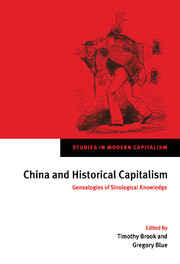Book contents
- Frontmatter
- Contents
- Preface
- Major dynastic periods in China's history
- 1 Introduction
- 2 The West, capitalism, and the modern world-system
- 3 China and Western social thought in the modern period
- 4 Capitalism and the writing of modern history in China
- 5 Towards a critical history of non-Western technology
- 6 The political economy of agrarian empire and its modern legacy
- Bibliography
- Index
4 - Capitalism and the writing of modern history in China
Published online by Cambridge University Press: 22 September 2009
- Frontmatter
- Contents
- Preface
- Major dynastic periods in China's history
- 1 Introduction
- 2 The West, capitalism, and the modern world-system
- 3 China and Western social thought in the modern period
- 4 Capitalism and the writing of modern history in China
- 5 Towards a critical history of non-Western technology
- 6 The political economy of agrarian empire and its modern legacy
- Bibliography
- Index
Summary
This chapter probes the historical relationship between China and the concept of capitalism. It is not about how capitalist relations emerged in China, nor about how foreign capitalism affected China; rather, it is about how the concept of capitalism affected Chinese and Japanese intellectuals of the twentieth century, what it meant to them, and how they variously used and resisted it to theorize the totality of Chinese history. This process of theorization took place within a particular set of historical conjunctures: engagement with radical social and political thought from the West at the point of dissolution of the system of rule by emperor; peripheralization in a world economic system dominated by Europe; active participation in the great anti-colonial movements before and after 1945. This set of conjunctures impelled Asian intellectuals to sustain a prolonged and unsettled interaction with capitalist theory and the cultural form of capitalist modernity. This interaction shaped how modern history has been written in China, and is not yet over.
Much of the intellectual production that has come out of this engagement tends now to be regarded as quaintly historical rather than substantively historiographical. It is both. How Chinese intellectuals through the twentieth century chose to think about where they were in the sweep of world history has certainly been an intimate part of this century's history; and, insofar as it guided the thinking of Mao Zedong and other political leaders, it has even helped to shape it.
- Type
- Chapter
- Information
- China and Historical CapitalismGenealogies of Sinological Knowledge, pp. 110 - 157Publisher: Cambridge University PressPrint publication year: 1999
- 9
- Cited by



